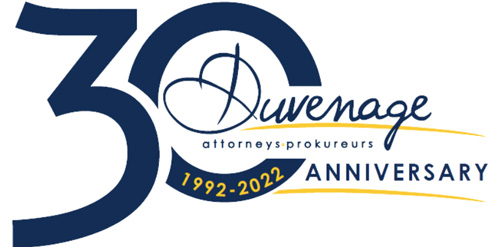VALIDITY OF ELECTRONIC SIGNATURES
The current nationwide restrictions as well as the need to enforce social distancing and limiting physical interactions with others, have made it difficult or undesirable for people to get together to physically sign new contracts. In addition, while most people have access to an electronic device and internet connection at home, not everyone has access to a printer and scanner. These circumstances along with the sense of urgency in many matters, have made it difficult for contracts to be signed and returned. The need for business activities to proceed under these circumstances have forced many businesses to proceed with verbal agreements or written understandings that have not been officially signed off.
Are only written agreements valid?
Many people mistakenly believe that only written agreements are binding and valid. Our law does generally not require formalities for concluding contracts and therefore a contract generally does not need to be in writing and signed to be valid. Certain exceptions to this general rule do require that certain contracts must be in writing, or which prescribe certain (unavoidable) formalities.
Verbal contracts, which are simple and convenient (even more so under the current circumstances), are difficult and complicated to enforce in the event of a dispute. Unless the verbal communication between the parties can be proven, it is very difficult to show an objective and clear record of all the terms and details of the agreement. If a dispute or disagreement arises between the parties, it could become a lengthy, problematic and possibly costly process to find an accurate solution or remedy.
Is physical signature required?
You might be wondering whether the original, physically signed version of the contract is required for it to be valid. Copies of electronic contracts, faxed and e-mailed versions of contracts, as well as scanned or electronically stored versions, are all feasible formats for legally binding contracts and are also enforceable.
It is now common for contracts to be electronically executed, with one person signing the contract, transmitting it in some electronic form to the other person, who then signs it and transmits a countersigned version back. It is also possible to have a legally binding contract that was signed in counterparts, that result in each party signing separate copies of the same agreement, which together form a valid and binding contract.
Electronic signature
The Electronic Communications and Transactions Act 25 of 2002 (“ECTA”) currently regulate electronic agreements, and confirms that digital communications are as equally legally valid as paper-based communications. ECTA allows electronic or “digital” signatures to be used as long as certain requirements are met.
In terms of ECTA an ordinary electronic signature is described as data attached to, incorporated in, or logically associated with other data and which is intended by the user to serve as a signature.
According to ECTA, there are both ordinary and advanced digital signatures that can be used in respect of transactions, depending on the circumstances. There are four examples of ways to establish a digital signature:
1. With the use of a stylus or your finger to draw your signature on a device that allows for this, such as touch screen devices.
2. By uploading an image/photo of your handwritten signature and placing it to the correct place in the applicable document.
3. With the use of your cursor or mouse to draw your signature. There are a number of programs that allow for the drawing of a signature in this way.
4. By typing your signature on your keyboard.
Are contracts with electronic signatures binding?
Generally, contracts that are electronically signed are valid, except where a law requires a signature by hand or in certain types of agreements that must be signed by hand (such as wills or antenuptial contracts).
It is important to remember that if you are going to make use of an electronic signature, such as by taking and using a photo of your signature, you should keep it safe and secure in order to ensure that not just anyone can obtain the image of your signature and use it recklessly or against your wishes.
Certain contracts that have already been concluded may prevent amendments by way of an electronic signature or data exchange. You should therefore look out for these non-variation clauses in current agreements that you want to amend.
What if am still unsure?
It is important to have a sense of certainty regarding the legal enforceability of contracts, especially in the current uncertain times. Electronic contracts will likely become a standard practice in doing business soon, so it is important to make sure that your written contract has complied with the requirements and that you are aware of the process for the contract to be considered as validly concluded. If you are unsure about concluding a contract by way of electronic signature, you should approach an experienced commercial attorney, such as Duvenage Incorporated, to ensure that your electronic agreements are indeed binding and enforceable.





